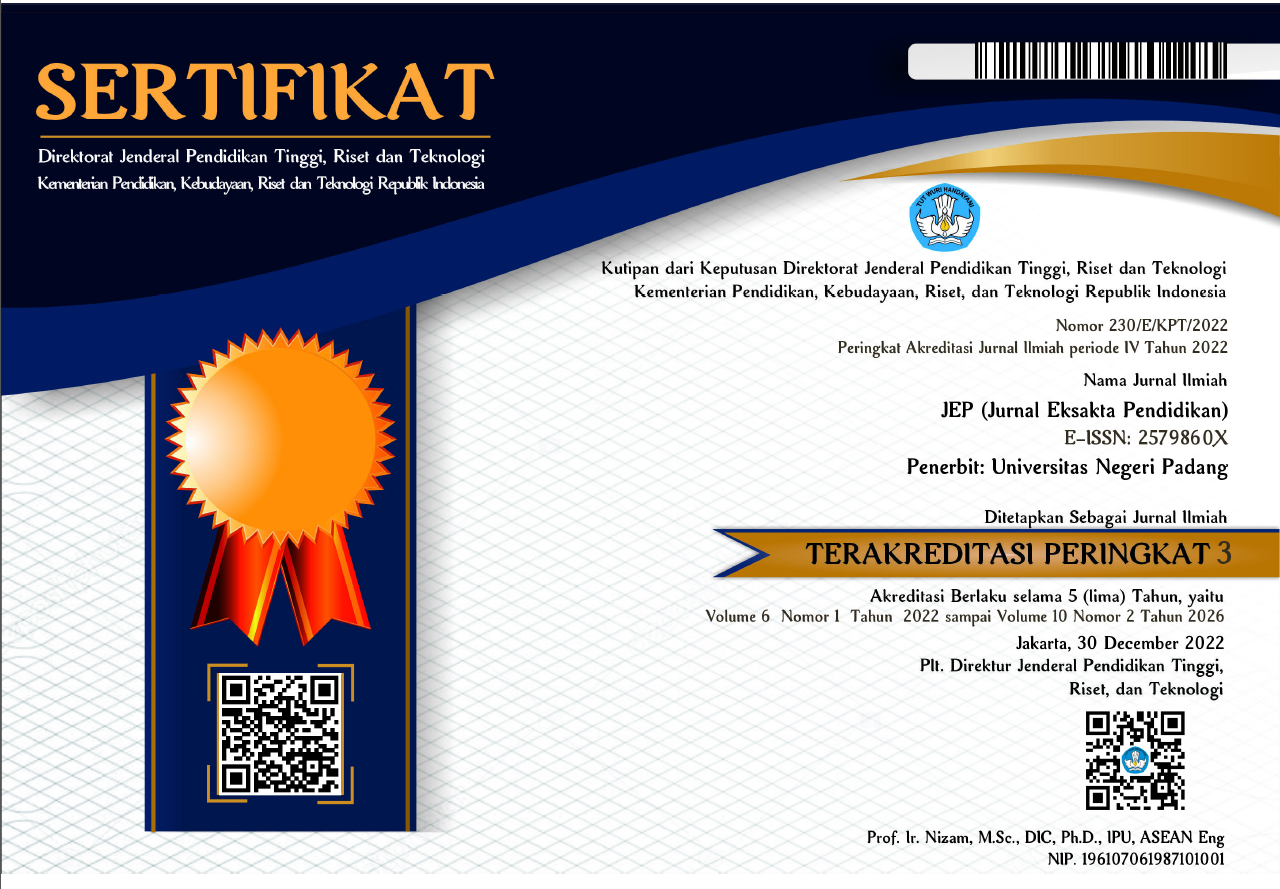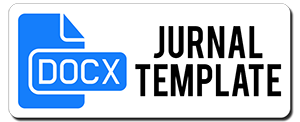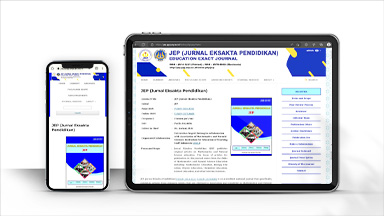Pengembangan Lembaran Kerja Siswa (LKS) Ekperimen Berbasis Guided-Inquiry Materi Laju Reaksi Untuk Siswa SMA / MA
Abstract
This study aims to produce teaching materials based material reaction rate guided inquiry (learning cycle: the phase of exploration, discovery / establishment of the concept and application) in the form of a valid experiment worksheets and practical use in learning chemistry in SMA / MA. This type of research included in Research and Development (R & D). The development model used in this study is the four-D (4-D). The research instrument is the validation sheet and questionnaire. Data from the study consists of three aspects, namely, the validity, the practicalities and effectiveness of teaching materials. Data validity and practicalities processed using Cohen's Kappa formula, and the effectiveness of data using a percentage In this study is limited to the validity and practicalities. Validation of teaching materials from the aspect of content, language and graffiti and feasibility of construction. Data from the validator obtained an average score moment kappa was 0.87, and the results of practical analysis conducted with a limited test in MAN 3 Padang obtained an average score of 0.84 practicality value of 0.78 of teachers and students. From the analysis worksheets that showed 86 % of students working on critical questions and exercises contained in LKS experiments that have been made can be answered students. These results indicate that LKS guided inquiry-based experiments developed extremely valid and practical use in learning chemistry
Downloads
References
Kurinasih, Imas dan Berlin Sami. 2014. Implementasi Kurikulum 2013 Konsep dan Penerapan. Surabaya: Kata Pena
Kementrian Pendidikan Nasional. 2014. Konsep dan Implementasi Kurikulum 2013. Jakarta: Kementrian Pendidikan dan Kebudayaan
Astuti, Rina, dkk. (2012). Pembelajaran IPA dengan Pendekatan Keterampilan Proses Sains Menggunakan Metode Ek-sperimen Bebas Termodifikasi dan Ek-sperimen Terbimbing Ditinjau dari Sikap Ilmiah dan Motivasi Belajar Siswa. Jurnal Inkuiri, Vol 1, No 1.
Sanjaya, Wina. 2006. Strategi Pembela-jaran Berorientasi Standar Proses Pen-didikan. Jakarta: Kencana Prenada Media Group
Driessen Michelle. 2011. ChemNews, Departmen of Chemistry Newsletter, Col-legeof Science& Engineering University of Minnesota
Hanson, David. M. 2005. Designing Process-Oriented Guided-Inquiry Activi-ties. In Faculty Guidedbook: A Compre-hensive Tool For Improving Faculty Per-formance, ed. S. W. Beyerlein and D. K. Apple. Lisle, IL: Pacific Crest.
Straumanis, Andrei. 2010. Process Ori-ented Guided Inquiry Learning. A Prac-tical Guide For Instruktor, Organic Chemistry: Guided Inquiry, Second Edi-tion. USA: Brool/Cole.
Hofstein, Avi dan Rachel Mamlok-Naaman. 2007. The Laboratory in Sci-ence Education. The State of the Art. Chemistry Education Research and Prac-tice e journal.2007, 8(2), 105-107
Hofstein, A and Lunetta V.N., 2003 The Laboratory in Science Education : f for the 21st century, Science Educa-tion Research 22, 28-54
Patrick, H.,dkk.2009. Motivation for Learning Science in Kindergarten: Is There a Gender Gap and Does Inte-grated Inquiry and Literacy Instruction Make a Difference. Journal Of Re-search In Science Teaching. Vol. 46 (2): 166–191
Bilgin, Ibrahim. (2009). The Effects of Guided Inqury Instruction Incorporat-ing, a Cooperative Learning Approach on University Students’ Achievement of Acid and Bases Concepts and Attitude Toward Guided Inqury Instruction. SRE, 4 (10): 1038-1046
Myers, Monypenny, & Trevathan. (2012). Overcoming the glassy-eyed nod: an application of process-oriented guided inquiry learning techniques in information technology. JLD, 5(1): 12-22
Andromeda, dkk 2014, Pengembangan Bahan Ajar berbasis guided inquiry dengan representasi chemistry triangle pada materi struktur Atom untuk siswa. Prosiding ISBN 978-602-70491-0-9, SEMIRATA 2014 Bidang MIPA BKS-PTN-Barat, IPB : 9-16
Andromeda, Iryani, Mawardi, Shavira Meidina Irham, 2015. Pengembangan bahan ajar hidrolisis garam berbasis guided-inquiry dengan representasi chemistry-triangle untuk siswa SMA/MA, Prosiding Seminar Nasional FMIPA UNP 2015
Andromeda, Bayharti, Mentari Delipu-tri , 2015. The development of guided inquiry-based worksheet for laboratory work on topic of colloidal system for senior high school instruction, Prosiding Seminar International ICOMSET FMIPA UNP 2016
Sugiyono. 2011. Metode Penelitian Pendidikan. Bandung: Alfabeta.
Trianto. 2012. Model Pembelajaran Terpadu. Jakarta: Bumi Aksara.
Depdiknas. 2008. Panduan Pengembangan Bahan Ajar. Jakarta: Departemen Pendidikan Nasional, Direktorat Jenderal Manajemen Pen-didikan Dasar dan Menengah, Direktorat Pembinaan Sekolah Menen-gah Atas.
Mudjijo. 1995. Tes Hasil Belajar. Jakarta: Bumi Aksara.
Boslaugh, Sarah dan Paul A. W. 2008. Statistics in a Nutshell, a desktop quick reference. Beijing, ``Cambridge, Fam-ham, Köln, Sebastopol, Taipei,Tokyo: O’reilly.
Yusuf, Syamsu dan Nani Sugandhi.2011. Perkembangan Peserta Didik. Jakarta: PT Raja Grafindo Persada.
Silabus Mata Pelajaran Kimia Untuk SMA. 2013.
Sugiyono. 2008. Metode Penelitian Pendidikan. Bandung: Alfabeta.
Hanson, David. M. 2006. Instructor’s Guided to Process-Oriented Guided-Inquiry Learning. Lisle, IL: Pacific Crest.
Sukardi. 2011. Evaluasi Pendidikan, Prinsip, Dan Operasionalnya. Yogya-karta: Bumi Aksara
Rochmad. 2011. model Pengembangan Perangkat Pembelajaran Matematika, Desain-Model Pengembangan. Online. http://www. scribd. com/ doc/ 78603100/

This work is licensed under a Creative Commons Attribution 4.0 International License.




_(2579-860X).png)
_(2614-1221)1.png)




